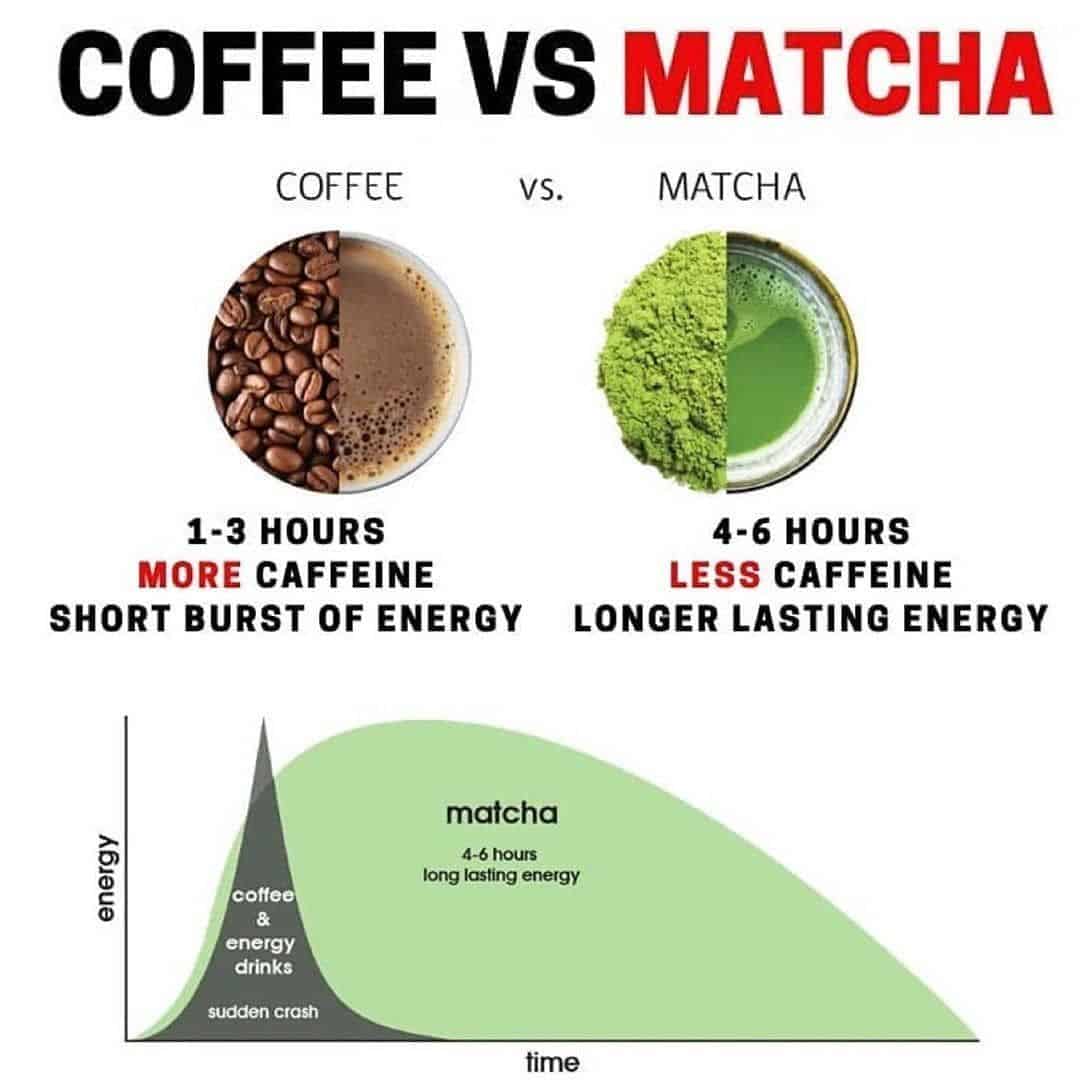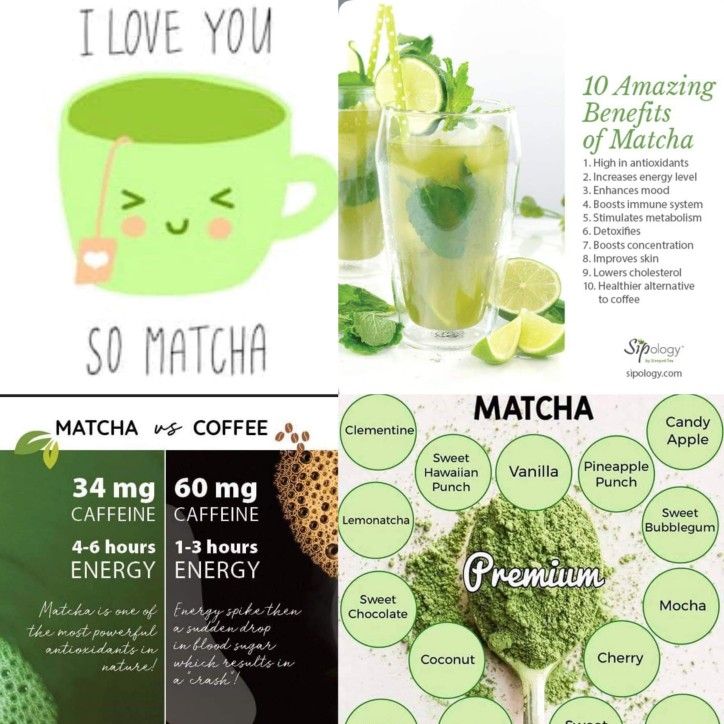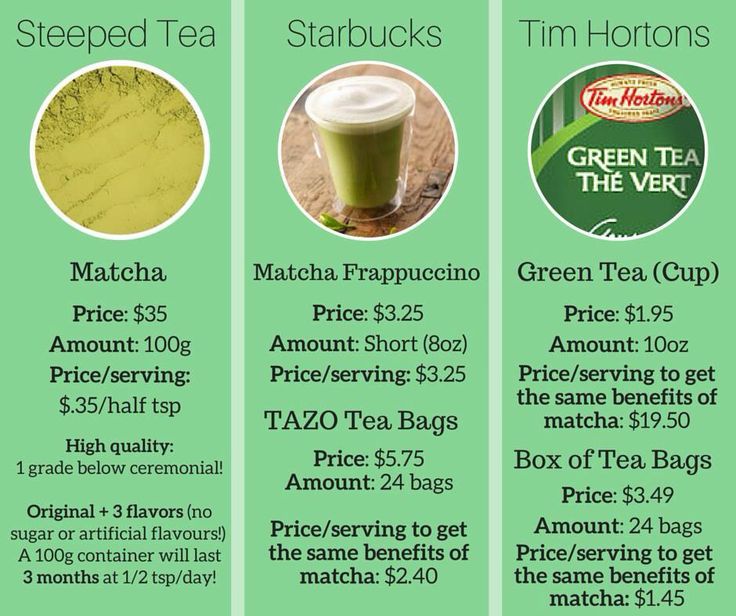Effects Of Caffeine In Matcha Vs Coffee
The problem with coffee is that the jolt does not last very long. There is the inevitable crash, you lose steam, start feeling reduced energy levels, and you reach for your second cup of coffee. In comparison, the energy boost from matcha will easily last 4 hours without such side effects.
This is possible because matcha has a large amount of L-theanine, an amino acid that helps the body feel calm, relaxed and focused. L-theanine also controls the absorption of caffeine in the bloodstream. Even though matcha generally does not have as much caffeine as coffee, the caffeine boost lasts longer. Instead of a massive immediate caffeine spike, the body gradually uses up the caffeine in matcha over a few hours.
Matcha Caffeine Vs Coffee Caffeine
When it comes to comparing caffeine levels, coffee contains more caffeine per serving than matcha. For example, the average cup of coffee contains 96 mg of caffeine per 8 ounces, while a 2-ounce cup of matcha, when prepared traditionally with one teaspoon, contains about 1850 mg/g. And did you know just one 1-ounce shot of espresso has up to 100 mg of caffeine?
Most coffee drinkers cannot rely on just one cup of coffee to get them through even half their day. The boost from coffee’s caffeine usually lasts a mere 13 hours and then leads to a sudden crash in energy levels. Then it’s time for another cup.
Having the four 8-ounce cups of coffee you may think you need to get you through the day, which is around 400 mg of caffeine, can be harmful to your health. Consuming up to 400mg/day of caffeine from coffee, or about 4 cups, has been shown to double the risk of headaches, panic attacks, feelings of being trapped or caught, anxiety, and feelings of worthlessness.
However, matcha releases slowly in the body, so you aren’t left with an uneasy feeling. Caffeine from matcha promotes a state of relaxation and overall well-being, providing 6 hours of sustained energy.
Does Matcha Have Health Benefits
Whereas other green tea leaves are usually steeped whole in hot water, matcha is much more concentrated in terms of the ingredients because its made from ground whole tea leaves, said Dr. Frank Hu, a professor of nutrition and epidemiology and chair of the department of nutrition at the Harvard T.H. Chan School of Public Health.
And while the research on its health benefits is not definitive, experts say that matcha does contain high amounts of potentially beneficial compounds.
Antioxidants. As we age or as were exposed to things in the environment, like ultraviolet light or carcinogens, we end up with reactive oxygen species and they do harmful things like damage our cellular membranes, said Jamie Alan, an associate professor of pharmacology and toxicology at Michigan State University.
Don’t Miss: How To Print On Coffee Mugs
Does Matcha Have More Caffeine Than Green Tea
What are the key differences between matcha and green tea? Caffeine is present in both matcha and traditional green tea in a quantity that is lower than that of coffee or black tea. It would appear that matcha has a higher caffeine content than conventional brewed green tea. Additionally, it seems to have a higher EGCG content.
Final Thoughts On Matcha Caffeine Vs Coffee Caffeine

While a cup of espresso in the morning will wake you up, it also spikes your stress hormones. Coffee caffeine is absorbed rapidly into the bloodstream, but you may notice after an hour that you have less energy and are more grumpy than you were before. Unlike coffee, caffeine from matcha is absorbed very slowly into the body, giving you a long and sustained energy boost rather than a quick spike.
Our superior quality matcha delivers numerous superpowered health benefits that include up to six hours of sustained energy, mental clarity, and calm alertness. You can easily add a cup of matcha to your daily routine or opt to mix culinary-grade matcha into your favorite recipes in the kitchen.
Are you looking to transition from coffee to matcha? We’ve got you covered. Learn step-by-step how to switch from drinking coffee to drinking matcha.
References:
You May Like: Does Zyn Coffee Have Caffeine
How Much Matcha Powder Should I Make Per Cup
This depends on how much matcha flavor you prefer. Generally, we say that two servings each of 2 grams or four servings each of 1 gram result in delicious tasting matcha. And since matcha tea is reported safe to consume as much as you prefer, you can decide how strong to make each cup and how many total servings to enjoy each day.
Which Has More Caffeine Coffee Or Matcha Tea
As was said earlier, the amount of caffeine that is included in one cup of matcha tea is around 70 mg, which is approximately 50 percent less than the amount of caffeine that is contained in one cup of coffee .But you shouldnt be concerned about getting your daily dose of caffeine.You may achieve the same level of alertness by drinking matcha.
Recommended Reading: When Can I Drink Coffee After Tooth Extraction
How Much Caffeine Is In A Matcha Hit
In normal circumstances, a hit of matcha might produce varying amounts of caffeine. What is the caffeine content of matcha? Caffeine levels in matcha tea can vary greatly from cup to cup. If one teaspoon of tea is dissolved in one cup of water, the total amount of caffeine that the tea contains is around 2 milligrams.
What Is The Optimum Amount Of Matcha To Have In A Day How Much Matcha Should I Drink In A Day
Try and aim to have at least 2 grams or two servings of matcha a day. Researchers have identified a minimum of 2g each day is needed to reap the full and long list of matcha health benefits, including its potent antioxidant properties.
Following the standard serving size of one gram of matcha tea powder, your desired health benefits may become most pronounced between 24 servings per day.
If youre interested in the cognitive performance benefits of matcha, or the potential protections against neurodegeneration, take note of recent research stating that of 4 servings of matcha in one day.
- It was found that this dose improved the speed of attention and memory functions in the human test group compared to controls .
You May Like: Is Caffeine Bad For Diabetics
Matcha Is Healthier Than Coffee
Matcha is not only a better choice in terms of quality of caffeine effects, but it also proves to be a healthier choice.
Matcha tea is extremely rich in antioxidants, with a concentration five times higher than that found in coffee.
It ranks with superfoods like Goji and Acai berries which are well know for their antioxidant power.
Antioxidants are precious allies for our health as they counteract the cell damage brought by free radicals and linked to many illnesses such as cancer and heart diseases.
Matcha green tea also supports the immune system, reduces bad cholesterol, lowers blood pressure, and boosts metabolism promoting weight loss. All these reasons makes it a remarkable health-boosting drink.
Reasons To Drink Matcha Instead Of Coffee
Caffeine is a fabulous chemical compound, and many of us have a strong relationship with it. In the US, 62% of adults drink coffee every day, at an average of three cups per day. Were officially hooked! As a coffee aficionado myself, I really get it why so many people love and depend on coffee. But is that relationship perhaps a bit codependent? For folks exploring whether a switch to a morning cup of matcha tea might be better for their health and wallets, were excited to put together this guide on the ways matcha is superior to coffee, and how you can get started with a new daily habit.
Matcha vs. Coffee: Top 5 Benefits of Matcha
Here are the top five reasons why matcha is the winner in the caffeine-off of matcha vs. coffee.
1) Matcha has a better caffeine high
Go on a deeper dive on the science of matcha and caffeine here:
2) Better breath
3)Better skin
4) More antioxidants
5) It’s WAY easier to make great matcha than great coffee
Matcha may have a reputation of being difficult to make, but seriously, does this sound hard?
Transitioning from coffee to matcha: getting started
What will it feel like to make the switch? Itll be different for everyone, but one convert told us, The effect of the caffeine feels different. Sometimes I miss the jolt, but I definitely don’t miss the jitters. Remember to be kind to yourself throughout the process. This is hard but worth it!
You May Like: Where To Buy Bulletproof Coffee
How Much Caffeine Is In A Matcha Latte Compared To Coffee
1) The caffeine high from matcha is superior than that of coffee Matcha, on the other hand, has none of those effects. It gives you a feeling of calm alertness while having only a sixth of the caffeine that coffee does . There are no abrupt increases or decreases rather, it builds up gradually and then fades away in the same way.
Less Equipment Is Needed To Make Matcha

At the minimum, all you really need to make a good matcha tea is a bottle and a source of hot water. Unlike coffee, you do not need any machines, french presses or drip filters. There is also no need for any messy grinding. A bamboo whisk will help make the process more enjoyable and perhaps easier. But it is not a requirement unless you are trying to make traditional matcha tea .
Don’t Miss: What Is The Best Light Roast Coffee
How Much Caffeine Is In Matcha Green Tea Latte
Additionally, one cup of coffee containing 8 ounces contains approximately 96 mg of caffeine, whereas one gram of matcha contains between 19 and 44 mg of caffeine, which equates to between 38 and 88 mg of caffeine in a serving size of 2 ounces if it is prepared according to the standard method . Nutrient comparison.
| Coffee |
|---|
| 0 grams |
Caffeine Effects In Matcha Last For Longer
After you drink a cup of matcha tea, caffeine doesn’t reach your blood all at once. Instead, it’s slowly released over time and its effects can last up to 8 hours.
This is because caffeine is bound to other chemicals, called catechins, and only after they are broken down and removed, caffeine can freely travel to the brain.
Catechins are specific antioxidants found in tea leaves but not in coffee beans, making this sustained release of caffeine a process unique to matcha green tea.
Don’t Miss: Is There Caffeine In Keto Pills
Why Should I Choose Green Tea
Aside from containing caffeine, green tea also contains theanine, known to produce calming effects.
While caffeine gives you an energy buzz and focus, it can also cause jitters and increased anxiety. Yet, when combined with theanine, green tea can energize without causing the racing feeling often associated with caffeine consumption. This is because theanine inhibits the absorption of caffeine in the brain, hence slowing the effects of caffeine.
Why Matcha Has More Caffeine Than Green Tea
Matcha has more caffeine than green tea simply because its concentrated in the form of a powder.
Standard green tea is ground into fine particles to form a powder called Matcha. This powdered consistency naturally means a cup of Matcha will have more caffeine than a regular cup of green tea. Heres more info on the caffeine content in green tea.
This concentrated form of green tea is what gives Matcha its thick and creamy texture.
More green tea is required to make one cup of Matcha, so this naturally means it has more caffeine than green tea.
Aside from the caffeine, this also means that the benefits of green tea are higher in a cup of Matcha.
Looking at the comparison, a cup of Matcha is equal to about 3 cups of regular green tea.
And as a guide, heres how many cups you should drink per day of each type of tea.
For caffeine, one regular cup of green provides 25-35 mg of caffeine whereas a cup of Matcha provides 70-100mg.
This does depend on how much Matcha powder you add.
However, a standard cup of Matcha calls for 3-4 teaspoons of Matcha powder. When using this measurement, then one cup of Matcha could hold 280mg of caffeine.
This high caffeine content deters many from drinking one full cup of Matcha tea at once.
Its common to see many matcha tea drinkers have 2-4 oz. rather than one cup 8 oz.
To get the benefits of one cup of Matcha, you would need to drink three cups of green tea.
Recommended Reading: Does Coffee Cause Bladder Infections
Read Also: Where To Buy Breville Espresso Machine
Is Matcha Easier On Stomach Than Coffee
Acidity compared to Coffee and Matcha The ph values of matcha hover around 9, making it an alkaline substance. If you have a stomach that is easily upset and are searching for a caffeinated beverage that is lower in acidity, matcha green tea is a better choice than coffee for you to consider in the morning.
Catechins And The Antioxidant Advantage
Matcha green tea powder is typically composed of catechins, caffeine, and amino acids. Catechins are potent antioxidants that can help prevent chronic conditions and promote a healthy lifestyle. EGCG is the most abundant catechin followed by epicatechin . Since matcha tea is formed from the entire green tea leaf, it has many times more antioxidants than regular green tea. The caffeine molecules found in matcha bind to matchas phytonutrients such as L theanine. This causes the caffeine in matcha to be released into the bloodstream over time, producing a much gentler increase in energy levels than what coffee drinkers experience.
As one of the main beneficial ingredients of matcha, EGCG makes up about 80% of total catechins. One study shows that habitual intake of EGCG can help enhance fat oxidation for weight loss and protect against chronic inflammation.6 It also plays a major role in balancing out the anxiety causing effects of caffeine. Instead of feeling skittish after a cup of coffee, matcha can promote a feeling of calm focus.
Recommended Reading: Does Walmart Sell Keurig Coffee Makers
What Caffeine Does To Your Body
Caffeine is a natural compound which is found in the leaves of the tea plant and in the beans of the coffee plant.
Within 30 minutes after we drink a cup of tea or coffee, caffeine is released in our bloodstream and reaches the brain.
Once there, it produces its effects by blocking the activity of a specific chemical, called adenosine, whose role is to make us feel sleepy and weary as we get tired through the day.
As caffeine counteracts the effects of this molecule, we immediately feel focused and energised.
In general, we perceive these effects mostly in the first 2 hours after consumption but they can extend up to 4 hours.
However, the duration and intensity of caffeine effect can differ from person to person as each of us metabolise caffeine in different ways.
How Much Caffeine Really Is In Green Tea

The FDA estimates the amount of caffeine for an 8 oz. cup of tea to be between 30 and 50 mg.
How much caffeine is in your cup depends on how much tea you are using to brew with.
Heres how some of our teas stack up:
- Hojicha When brewed according to our recommended guidelines, our Hojicha doesnt exceed 20 mg of caffeine per cup.
- Sencha Fukamushi Our signature Sencha can range from 27 mg to 41 mg of caffeine per cup, depending on brewing time.
- Organic Ceremonial Matcha A cup made with 1g of our Organic Ceremonial Matcha will contain 29 mg of caffeine.
The difference in caffeine content for green tea, which ranges from 1.6-3.5%, depends when the tea leaves were harvested. Another factor that can contribute to the levels of caffeine in green tea is brewing time.
To find out how much caffeine is in green tea, lets compute based on the example given by the FDA.
If you have 8 oz of water with roughly 2.5 grams of tea leaves, you should have around 40-88 mg of caffeine. However, it doesnt end there because not all of the caffeine is extracted into the water.
In the first 60 seconds of steeping, around 60% of the caffeine will be extracted if you use water that is 176° F. If the water is cooler, you will extract less caffeine. To extract 90% or more of the caffeine, you must steep the tea leaves for a full two minutes. This is represented in the chart below.
Read Also: How Much Caffeine Does Dr Pepper Have In It
What Is A Starbucks Matcha
Starbucks Matcha Drinks: Quick Facts Starbucks matcha tea blend powder is a combination of sugar and ground Japanese green tea. Starbucks matcha drinks are not available sugar-free. Every Starbucks matcha contains caffeine. The amount of caffeine in Starbucks matcha depends on the size drink you order.